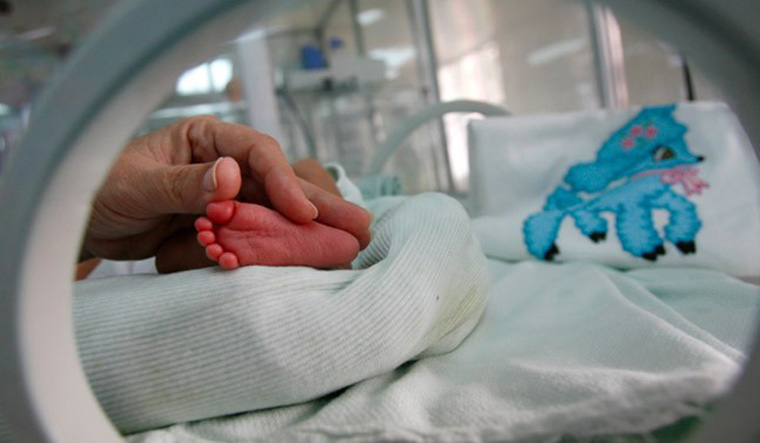While it is not uncommon to see infants born with congenital disorders, one of the rare phenomena is when a baby is born with intestinal malrotation which results from the abnormal rotation of the intestine at the stage of foetal development. Recently, one such case was observed at Mumbai's Wockhardt hospital where a six-day-old premature baby boy born with a low birth weight was not accepting feeds due to intestinal malrotation.
This also resulted in the baby suffering from acute dehydration. "1 in 10,000 babies suffers from malrotation and need timely intervention. Intestinal malrotation means that the intestines are twisting and lead to obstruction or blockages," said Dr Nitu Mundhra, NICU in charge and consultant neonatologist at the hospital. One reason for malrotation is the presence of Ladd bands which are peritoneal fibrous bands which lead to the disarrangement of intestines by compressing the duodenum - the first part of the small intestine that connects to the stomach and helps in the digestion of food. The doctors carried out a laparoscopic procedure and discharged the baby boy after he attained 1.6 kg of weight.
The child's Mumbai-based mother, Deepali Jadhav gave birth to twins, one boy and one girl on July 28 this year. But her happiness was short-lived as her son refused to feed because of which he began losing weight rapidly. “Initial imagery reports were inconclusive. Hence, based on a strong suspicion of surgical pathology we did a 'barium follow through' study that revealed intestinal malrotation. The baby was put on IV fluids to overcome dehydration before scheduling him for surgery," said Dr Mundhra. The barium tests are used to look for problems in the small intestine, and to see clearly the outline of the upper parts of the gut that is the gastrointestinal tract, the oesophagus, stomach and upper gut (small intestines). As per the doctor, laparoscopy revealed mid-gut malrotation with Ladd’s bands obstructing the duodenum and narrow root of mesentery all of which was corrected. The baby tolerated the procedure well, was extubated the next morning and began feeding through the bottle. Within eight days post the surgery, the baby had reached the full feed requirement and was discharged in the next two days with healthy body weight. As per doctors, laparoscopy in very young children is very challenging due to the requirements of anaesthesia, surgical skills and post-operative care.
This baby boy became the youngest to be operated via laparoscopy so far. Laparoscopic surgery enables fast recovery with negligible wounds and minimal tissue trauma allowing for a healthy and active physical life in children as they grow up, say experts. Although asymptomatic malrotation may remain undiscovered when symptomatic, 75 per cent will present before the age of five. "We initiated the Total parenteral nutrition (TPN) for the baby. It is the method of feeding that bypasses the gastrointestinal tract, and fluids are given directly into a vein to give nutrients that the baby’s body requires. Not treating him/her at the right time could have led to serious complications such as severe dehydration, hypernatremia, perforation, and renal failure. Parents are happy as they can now give breastfeed to him like the other twin," said Dr Mundhra.
Jadhav, the baby's mother said they figured there was a problem when they saw that the baby completely refused feeds and remained without feeds for over three days at a stretch. "He was turning pale, dehydrated, inactive and cranky. But now he's been responding well to breastfeeding and hasn't thrown up at all," said Jadhav.



